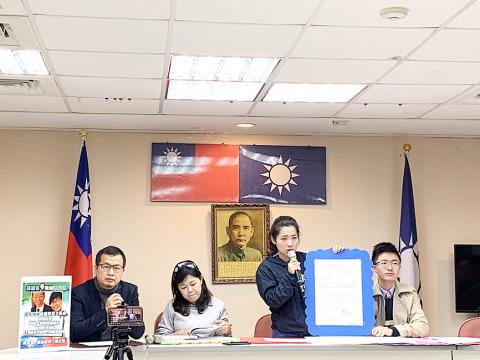Taipei city councilors from the Chinese Nationalist Party (KMT) and the New Party yesterday accused Yang Hui-ju (楊蕙如) of using her ties within the Democratic Progressive Party (DPP) to receive government funding.
KMT Taipei City Councilor Hsu Chiao-hsin (徐巧芯) showed reporters in Taipei a 2016 letter in which Yi Shih, a company founded by Yang, appeared to ask the Taipei City Government to provide an official document approving the company’s cohosting of the WTA Taiwan Open.
The letter showed that it was copied to five city councilors, all of whom belong to the so-called “faction” of Representative to Japan Frank Hsieh (謝長廷), she said.

Photo: Kuo An-chia, Taipei Times
Yang might have sent the councilors duplicates to show the city government that she had the backing of the councilors, she added.
The copied councilors have not expressed their opinions on the matter, Taipei Department of Sports Deputy Commissioner Liu Ning-tien (劉寧添) said, adding that the government subsidies for the tournament were reviewed and awarded according to the regulations.
Yi Shih received about NT$42 million (US$1.38 million at the current exchange rate) from the city government in contracts and subsidies for the 2017 WTA Taiwan Open, and about NT$50 million for last year’s tournament, the city councilors said.
The funds were provided in part by the Sports Administration; the Tourism Bureau; the Taipei Department of Sports; the Taipei Department of Information and Tourism; EasyCard Corp; Chunghwa Telecom; CPC Corp, Taiwan; and China Airlines, they said.
Hsieh and the DPP have distanced themselves from Yang, but Yang “does not want to distance [herself],” KMT Taipei City Councilor Lo Chih-chiang (羅智強) said.
“How was Yang able to obtain so much government funding?” Lo asked.
DPP Deputy Secretary-General Lin Fei-fan (林飛帆) on Tuesday said that Yang and the DPP have “no ties,” KMT Taipei City Councilor Yu Shu-hui (游淑慧) said, but added that photographs show Yang and DPP members at private gatherings.
Yang became a DPP member in 2008 and previously ran in DPP legislative primaries, she said.
Yang was being “fed by the DPP,” New Party Taipei City Councilor Ho Han-ting (侯漢廷) said.
A netizen on Tuesday night wrote on the online bulletin board Professional Technology Temple that an IP address used by Yang is the same as an IP address at DPP Legislator Huang Kuo-shu’s (黃國書) office, he said.
Ho called on Huang to explain whether he lent his Legislative Yuan office to a “Internet army” so that it could “attack” an official.
The Taipei District Prosecutors’ office on Monday said that Yang paid NT$10,000 per month to members of her “Internet army” to post articles on popular social media platforms and comment on news stories in an attempt to influence public opinion.
Additional reporting by Lee I-chia

ANOTHER EMERGES: The CWA yesterday said this year’s fourth storm of the typhoon season had formed in the South China Sea, but was not expected to affect Taiwan Tropical Storm Gaemi has intensified slightly as it heads toward Taiwan, where it is expected to affect the country in the coming days, the Central Weather Administration (CWA) said yesterday. As of 8am yesterday, the 120km-radius storm was 800km southeast of Oluanpi (鵝鑾鼻), Taiwan’s southernmost tip, moving at 9kph northwest, the agency said. A sea warning for Gaemi could be issued tonight at the earliest, it said, adding that the storm is projected to be closest to Taiwan on Wednesday or Thursday. Gaemi’s potential effect on Taiwan remains unclear, as that would depend on its direction, radius and intensity, forecasters said. Former Weather Forecast

As COVID-19 cases in Japan have been increasing for 10 consecutive weeks, people should get vaccinated before visiting the nation, the Centers for Disease Control (CDC) said. The centers reported 773 hospitalizations and 124 deaths related to COVID-19 in Taiwan last week. CDC Epidemic Intelligence Center Director Guo Hung-wei (郭宏偉) on Tuesday said the number of weekly COVID-19 cases reported in Japan has been increasing since mid-May and surpassed 55,000 cases from July 8 to July 14. The average number of COVID-19 patients at Japan’s healthcare facilities that week was also 1.39 times that of the week before and KP.3 is the dominant

The Chinese Communist Party’s (CCP) working group for Taiwan-related policies is likely to be upgraded to a committee-level body, a report commissioned by the Mainland Affairs Council (MAC) said. As Chinese President Xi Jinping (習近平) is increasingly likely to upgrade the CCP’s Central Leading Group for Taiwan Affairs, Taiwanese authorities should prepare by researching Xi and the CCP, the report said. At the third plenary session of the 20th Central Committee of the CCP, which ended on Thursday last week, the party set a target of 2029 for the completion of some tasks, meaning that Xi is likely preparing to

US-CHINA TRADE DISPUTE: Despite Beijing’s offer of preferential treatment, the lure of China has dimmed as Taiwanese and international investors move out Japan and the US have become the favored destinations for Taiwanese graduates as China’s attraction has waned over the years, the Ministry of Labor said. According to the ministry’s latest income and employment advisory published this month, 3,215 Taiwanese university graduates from the class of 2020 went to Japan, surpassing for the first time the 2,881 graduates who went to China. A total of 2,300 graduates from the class of 2021 went to the US, compared with the 2,262 who went to China, the document showed. The trend continued for the class of 2023, of whom 1,460 went to Japan, 1,334 went to